

“Education is broken, somebody should do something” #altc2013. David Kernohan – presentation at ALT-C2013, Nottingham.
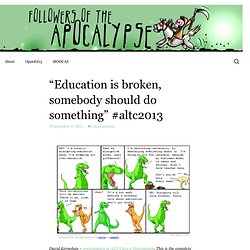
This is the complete text of the presentation, with added links for clarity As long as there has been education, it has been broken. For all the struggles of the finest teachers, for all the ingenuity of the greatest publishers, for all the grand buildings, the government regulations, the league tables and swathes of measurement and data – sometimes some people did not learn something that it was expected that they would. This is not their story. It is, in fact, the story of an entirely different group of people, many of whom have seen some significant success in their own education, others of which gave up on the whole thing as a bad job and have been grumpily poking it with sticks ever since.
In this group I would include several commentators, salespeople, bloggers, Sir Michael Barbers… but most of all I would include journalists. Predatory Learning. Editors' Note: This is the first of a four-part series on education reform, online technology, and the future of learning.
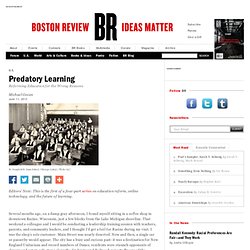
Several months ago, on a damp gray afternoon, I found myself sitting in a coffee shop in downtown Racine, Wisconsin, just a few blocks from the Lake Michigan shoreline. That weekend a colleague and I would be conducting a leadership training session with teachers, parents, and community leaders, and I thought I’d get a feel for Racine during my visit. I was the shop’s sole customer. Main Street was nearly deserted. Now and then, a single car or passerby would appear. A few hours later, in a large hall in a Roman Catholic retreat center a few miles up the shore, more than 40 Racine residents were seated in groups of six around large round tables. The School District has announced that it has signed an agreement with a major online learning company—Future Success, Inc.
As the group concentrated on the page, there was a stirring at one of the tables. Nathan Heller: Is College Moving Online? Gregory Nagy, a professor of classical Greek literature at Harvard, is a gentle academic of the sort who, asked about the future, will begin speaking of Homer and the battles of the distant past.
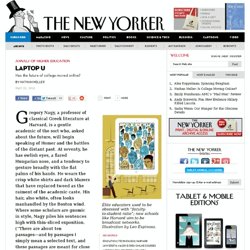
At seventy, he has owlish eyes, a flared Hungarian nose, and a tendency to gesture broadly with the flat palms of his hands. He wears the crisp white shirts and dark blazers that have replaced tweed as the raiment of the academic caste. His hair, also white, often looks manhandled by the Boston wind. Where some scholars are gnomic in style, Nagy piles his sentences high with thin-sliced exposition.
(“There are about ten passages—and by passages I simply mean a selected text, and these passages are meant for close reading, and sometimes I’ll be referring to these passages as texts, or focus passages, but you’ll know I mean the same thing—and each one of these requires close reading!”) Nagy has published no best-sellers. But MOOC s are controversial, and debate has grown louder in recent weeks. The MOOC Moment and the End of Reform. A shortened version of this paper was given at UC Irvine last week, with the great Tressie McMillan Cottom talking about MOOCs and for-profit education.
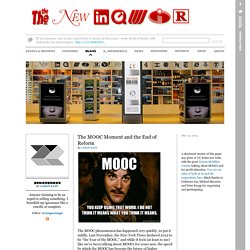
You can see video of both of us and the respondents here. Much thanks to Catherine Liu, Michael Meranze, and Peter Krapp for organizing and participating. The MOOC phenomenon has happened very quickly, to put it mildly. Last November, the New York Times declared 2012 to be “the Year of the MOOC,” and while it feels (at least to me) like we’ve been talking about MOOCs for years now, the speed by which the MOOC has become the future of higher education is worth thinking carefully about, both because it’s an important way to frame what is happening, and because that speed warps the narrative we are able to tell about what is happening. The MOOC phenomenon is also a shift in discourse, a shift that’s happened so quickly and so recently, that it fills up our mental rear-view mirror.
For example. I mean that in two different ways. xMOOC / cMOOC. Mooc : les cours universitaires sur Internet bouleversent la formation. Californie : les cours en ligne pourront mener à un diplôme. Recevez nos newsletters : Une loi présentée mercredi devant le Sénat californien veut obliger les universités publiques à accorder des crédits aux étudiants suivant certains cours en ligne.
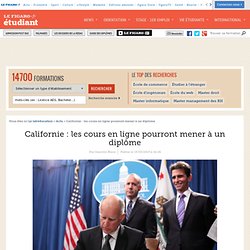
L’éducation supérieure en ligne : mode d’emploi. Recevez nos newsletters : Des millions de personnes suivent maintenant les cours en ligne de Harvard ou Stanford.
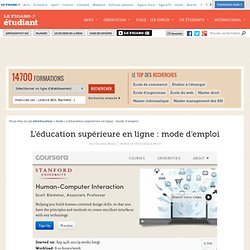
MOOC: les édu-hackers à l’assaut de l’éducation. Le 25 mars, le Monde publiait un article au titre provocateur « Les MOOC à l’assaut du mamouth« .
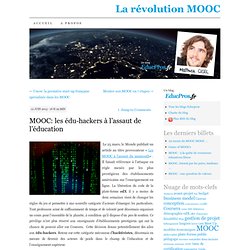
Il faisait référence à l’attaque en règle menée par les plus prestigieux des établissements américains sur l’enseignement en ligne. La libération du code de la plate-forme edX il y a moins de deux semaines vient de changer les règles du jeu et permettre à une nouvelle catégorie d’acteurs d’émerger: les particuliers. Tout professeur armé de suffisamment de temps et de volonté peut désormais organiser un cours pour l’ensemble de la planète, à condition qu’il dispose d’un peu de soutien.
Ce privilège n’est plus réservé aux enseignants d’établissements prestigieux qui ont la chance de pouvoir aller sur Coursera. Cette décision donne potentiellement des ailes aux édu-hackers. La définition de édu-hacker est assez flexible. Online universities: it's time for teachers to join the revolution. The past few centuries have witnessed revolutions in virtually every area of our world – health, transport, communications and genomics, to name but a few.
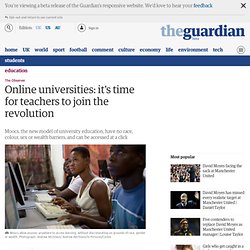
But not in education. Until now, that is, with the advent of Moocs (massive open online courses). Moocs are transforming education in both quality and scale. As president of edX, the only non-profit Mooc provider, I have the privilege of being part of this revolution. Go Back to School on the Web. If you’re looking to brush up your academic skills but can’t quite afford the time or money to go back to school, the following two sites offer intellectual stimulation at no cost, and you can access them at a moment’s notice.

Nonprofit site Khan Academy offers short videos-- each about 10 minutes long on average--explaining topics in math, science, history, economics, and some test prep. Although its collection of humanities videos is slim, Khan Academy has an astounding number of math and science videos, explaining everything from basic arithmetic to “partial derivatives of vector valued functions.” All the courses are conducted with a human instructor’s voice over a blackboard-style screen, so you never actually see a person. For some people, this arrangement might work better as a learning strategy because you can just focus on the facts and figures in front of you. Many of the videos have supplemental problem sets that you can use to practice the things you just learned. Maxime Legrand (Révolution éducative) : "En France, nous risquons d'être plus ploucs que Mooc" Pour le président du think tank Révolution éducative, l'Hexagone rate le train de l'enseignement en ligne et des savoirs de demain.
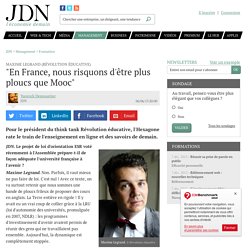
JDN. Le projet de loi d'orientation ESR voté récemment à l'Assemblée prépare-t-il de façon adéquate l'université française à l'avenir ? Maxime Legrand. Non. Parfois, il vaut mieux ne pas faire de loi. Grâce aux MOOC, étudiez à Harvard depuis votre salon. Les nouveaux acteurs de l'éducation. "Dans cinq ans, vous serez en mesure de trouver les meilleures conférences du monde gratuitement sur le Web.
Ce sera mieux que n'importe quelle université. " Bill Gates tient ces propos en 2010. The New Yorker article dives into MOOC controversy. The democratization of information would stand to benefit the world. However, does the variety of ideas in the university environment might be an unfortunate casualty of the MOOC revolution? When you think about it, the education infrastructure in the United States is about as decentralized as you can get. Thousands of universities teach similar versions or the same material. If you wanted to learn about geography, for example, you have your choice of several thousand introductory courses at colleges and universities across the country—many of which have their own textbooks, perhaps with their own regional focus, and professors with their own expertise and bias.
L’innovation éducative : une question économique ? ... la promesse des "MOOC" LA GRATUITE DES CONTENUS UNIVERSITAIRES est peut-être à nos portes ! - Mario ASSELIN. Note : Ce billet a d’abord été publié au Huffington Post Québec dans la section « blogue ». Je reviens de France où ma pratique professionnelle m’a mené jusque dans le Vercors pour traiter de l’arrivée des jeunes nés avec la présence d’Internet dans les universités et sur le marché du travail. Mooc : la standardisation ou l’innovation. Le développement des cours en ligne massifs et ouverts (Mooc pour massive online open courses) attise autant l’enthousiasme que le rejet. Pourtant, comme nous l’avons déjà signalé, ils n’ont rien de magique et paraissent bien souvent plus une réponse économique qu’éducative.
En accentuant la concurrence entre universités et entre les étudiants eux-mêmes… les Mooc semblent répondre à un problème pédagogique par une solution économique très spécifique. Or, l’enjeu éducatif n’est pas là. Hybrid Pedagogy: A Digital Journal of Learning, Teaching, and Technology. Tous diplômés d'Harvard, le fantasme des cours en ligne. Pourquoi y a t-il si peu de MOOCs pour apprendre les langues ? Alors que les offres de MOOCs se structurent et se diversifient, un domaine d'apprentissage reste remarquablement absent des catalogues proposés par les groupements et établissements : celui des langues vivantes.
Ceci est d'autant plus étonnant que l'apprentissage d'une langue étrangère, et de l'anglais en particulier pour ce qui est de la France et de l'Afrique francophone, reste au sommet des demandes de formation émises par les travailleurs. Q&A with Christensen and Eyring on their new book: "The Innovative University" The Big Three MOOC Providers. Massive Open Online Courses Are Multiplying at a Rapid Pace. That’s what everyone is trying to figure out. Many places offer MOOCs, and more will. But Coursera, Udacity and edX are defining the form as they develop their brands. Coursera casts itself as a “hub” — Dr. Ng’s word — for learning and networking. The learning comes gratis from an impressive roster of elites offering a wide range of courses, from computer science to philosophy to medicine. While Coursera will make suggestions, Dr.
No one showed at the meet-up that Stacey Brown, an information technology manager at a Hartford insurance company, scheduled for a 14th-floor conference room on a Thursday after work, despite R.S.V.P.’s from a few classmates in the area. Others like the discipline a group offers. Udacity has stuck close to its math and computer science roots and emphasizes applied learning, like “How to Build a Blog” or “Building a Web Browser.” Udacity courses are designed and produced in-house or with companies like Google and Microsoft.